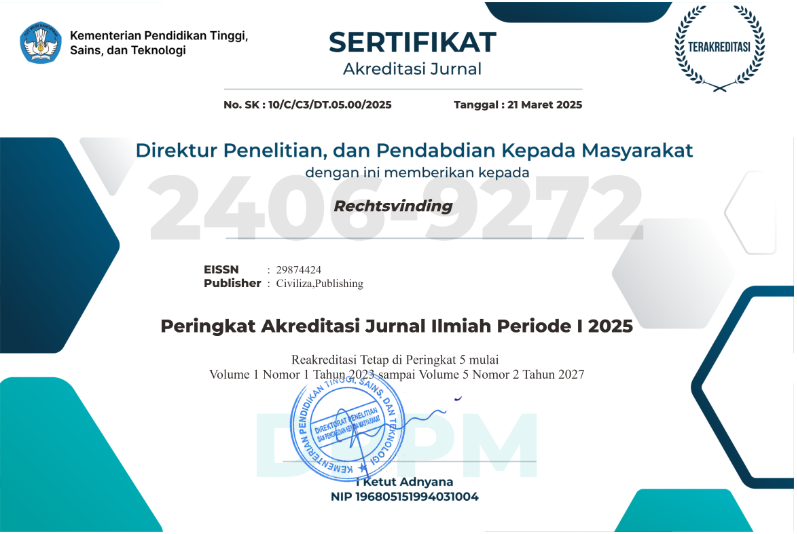Open Legal Policy Regarding the Age Limit of Notary Public Based on Constitutional Court Decision Number. 84/PUU-XXII/2024
DOI:
https://doi.org/10.59525/rechtsvinding.v3i1.790Keywords:
Open Legal Policy; Notary Age; Constitutional Court;Abstract
Open legal policy emerged when the 1945 Constitution gave an order to regulate a norm through a law, in this case the Legal Regulation of Article 8 Paragraph (2) of Law Number 2 of 2014 as an amendment to Law Number 30 of 2004 concerning the Position of Notary. The research method used is normative juridical or library research, by analyzing library materials or secondary data relevant to the topic. This research is descriptive analytical, namely the data obtained and processed and analyzed to provide a comprehensive picture of the open legal policy in the norming of Article 8 paragraph (2) which regulates the age limit of the notary office as stated in Law Number 2 of 2014 concerning Amendments to Law Number 30 of 2004 concerning the Position of Notary. Research Results Show that the determination of the age limit for notaries is part of an open legal policy that is within the authority of the legislators, as long as it does not conflict with the principles guaranteed in the 1945 Constitution. However, this policy can be considered invalid if it violates constitutional principles, such as the principle of non-discrimination, equality before the law, and the feasibility and rationality of public policy.
References
Ajie, R. (2016). Limitations of Policy Choices of Lawmakers (Open Legal Policy) in the Formation of Legislation Based on the Interpretation of Constitutional Court Decisions. Indonesian Legislation, 13(02), 111–112.
Aprilia, D., Putra, DE, Khusnah, LH, Ruddiah, NZ, Sundari, S., & Winata, VM (2024). Civil law as a link between individuals and legal entities. 1(2), 26–35.
Bachrudin. (2015). Notary Position in Indonesia in the Snare of Liberalization. Journal of Legal Reform, 2(2), 185–196.
Harahap, M., Lubis, MA, Lubis, HF, & Rizky, A. (2023). Reflections on Criminal Law Politics. In Eureka Media Aksara. Eureka Media Aksara.
Illiyyin, DZ, & Octarina, NF (2023). The Role of Notaries in Creating Legal Certainty for Investors. Journal of Civic Law, 8, 14–27. https://ejournal.umm.ac.id/index.php/jurnalcivichukum/article/view/22565%0Ahttps://ejournal.umm.ac.id/index.php/jurnalcivichukum/article/download/22565/12328
Lubis, MA, Hamdani, A., Harahap, M., & Munthe, GE (nd). Harmonization of Law Towards Meaningful Participation in the Formation of Legislation Based on.
Lubis, M. yusrizal adi & MA (2024). Constitutional Law. In Constitutional Law (I, pp. 1–250). Eureka Media Aksara. https://repository.penerbiteureka.com/publications/563313/hukum-tata-negara
Mahmud, P. (2005). Legal Research. Kencara Prenada Media Group.
Mantara Sukma, GG (2020). Open Legal Policy of Political Legislation in Constitutional Court Decisions (Study of Constitutional Court Decisions in Political Fields 2015-2017). Lex Renaissance Journal, 5(1), 1–19. https://doi.org/10.20885/jlr.vol5.iss1.art1
Perdana, P., Saifulloh, A., Hukum, F., Bengkulu, U., & Limun, K. (2022). Presidential Threshold Open Law in Law. 11(April), 153–172.
Constitutional Court Decision Number 84/PUU-XXII/2024.
Ramdani, MD, & Arisandi, F. (2014). The Influence of the Use of the Open List Proportional People's Representative Council General Election System. Jurnal Rechts Vinding: Media for National Legal Development, 3(1), 101. https://doi.org/10.33331/rechtsvinding.v3i1.59
Sukanto, S. and SM (2009). Normative Legal Research: A Brief Review. PT Raja Grafindo Persada.
Law Number 30 of 2004 concerning the Position of Notary, (2004).
Downloads
Published
How to Cite
Issue
Section
License
Copyright (c) 2025 Gerald Elisa Munthe

This work is licensed under a Creative Commons Attribution 4.0 International License.








